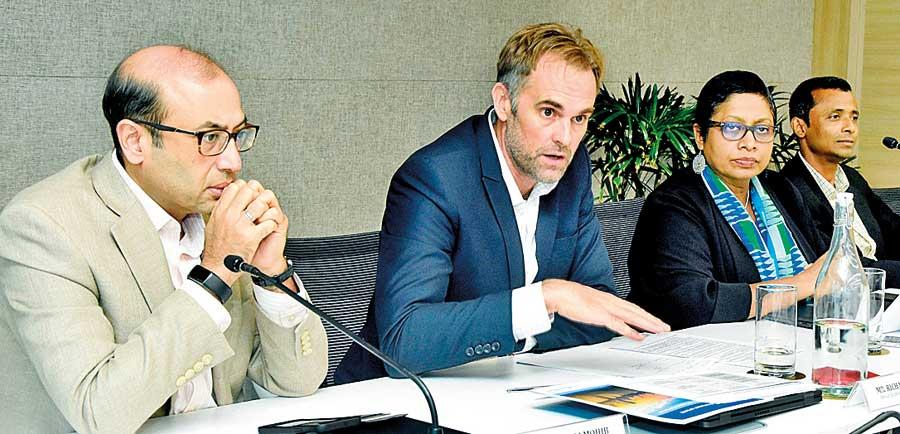04 Oct 2023 - {{hitsCtrl.values.hits}}

From left: Shabih Ali Mohib, Practice Manager, Macroeconomics, Public Sector, Trade and Investment; Richard Walker-Senior Economist; Dilinika Peiris-Holsinger-External Affairs Officer and Kishan Abeygunawardana-Senior Economist
Pic by Nimalsiri Edirisinghe
By Nishel Fernado
While revising Sri Lanka’s growth forecast upwards for next year, the World Bank (WB) yesterday called for improved revenue mobilisation for sustainable fiscal stability, as significant downside risks continue to cloud the outlook.
The World Bank in its twice-a-year development update projected the Sri Lankan economy to grow by 1.7 percent next year from earlier projected 1 percent. The development lender also expects the economy to shrink by 3.8 percent this year, below the earlier expected
4.2 percent contraction.
The World Bank’s Sri Lanka Office, Senior Country Economist, Dr. Richard Walker outlined that the economy has shown initial signs of stabilising with inflation returning to single digits and improvement seen in the accumulation of foreign reserves.
However, he cautioned that the outlook is still clouded by significant uncertainty and downside risks.
“The outlook is clouded by significant uncertainty and downside risks exist. Growth prospects will depend on the progress with debt restructuring as well as the continued implementation of growth enhancing structural reforms,” he noted.
World Bank economist also warned that further loosening of monetary policy could buck the current downward
inflationary trend.
“We see further monetary loosening and potential exchange rate pressures which could counter this downward inflationary trend,” Walker said.
Although primary deficit will continue to decline in line with the IMF programme, the World Bank officials stressed that the country needs to boost tax revenue.
“Sri Lanka has carried out critical reforms since the start of the economic crisis. Staying the course on reforms while managing fiscal risks is crucial to restore a sustainable growth path. Current efforts to mobilise tax revenue should be coupled with continued reforms towards transparency of expenditures to build public confidence and to deliver better public services,” said Faris H. Hadad-Zervos, World Bank Country Director for Maldives, Nepal, and Sri Lanka.
While the measures already introduced in 2022 and 2023 have led to higher revenues, the World Bank noted that further reforms are needed to ensure that the tax system is efficient, sustainable, and equitable.
“Over January–April 2023 (YoY), nominal tax revenue collection increased by 36.6 percent driven by both 2022 reform package and higher inflation. Nevertheless, revenue collection in the first four months of 2023 remains significantly below the approved budget,” the World Bank noted.
In the ‘Sri Lanka Development Update, Mobilising Tax Revenue for a Better Future’ released yesterday, the World Bank made several recommendations to improve revenue mobilisation by increasing the effective tax rates for select major taxes, broaden the tax base, and improve tax administration. The World Bank proposed to impose a minimum corporate income tax on book profits, strengthen capital taxation, rationalise tax incentives and publish tax expenditure statements, effective implementation of the tax administration modernisation strategy, strengthen third-party information use, boost taxation of large and high net worth taxpayers, strengthen dispute resolution and enhance tax administration infrastructure for this purpose. According to the World Bank, Sri Lanka has one of the lowest tax-to-GDP ratios in the world. As of 2022, the tax system was characterised by low, multiple, and frequently changing rates, a narrow and shrinking base, a high tax burden on labour rather than capital incomes, an over-reliance on indirect taxes, and a weak administration with poor compliance outcomes. These features have made the system complex, inefficient and inequitable. The fiscal consolidation in Sri Lanka is expected to shrink the fiscal deficit considerably from 12 percent in 2021 to 7.8 percent in 2023 and 5 percent in 2025., which will be critical to avert a time-consuming debt restructuring process.
World Bank also noted anticipated debt restructuring and reforms could boost investor confidence in 2024, while investment is expected to contract in 2023.
However, the World Bank expects the poverty rates to continue to rise this year.
“As Sri Lanka starts the necessary reforms and transition to correct external imbalances, poverty will rise initially, and better-targeted social assistance programnes will be needed to limit the impact of reforms on poverty,” it said.
02 Jun 2024 5 minute ago
01 Jun 2024 01 Jun 2024
01 Jun 2024 01 Jun 2024
01 Jun 2024 01 Jun 2024
01 Jun 2024 01 Jun 2024